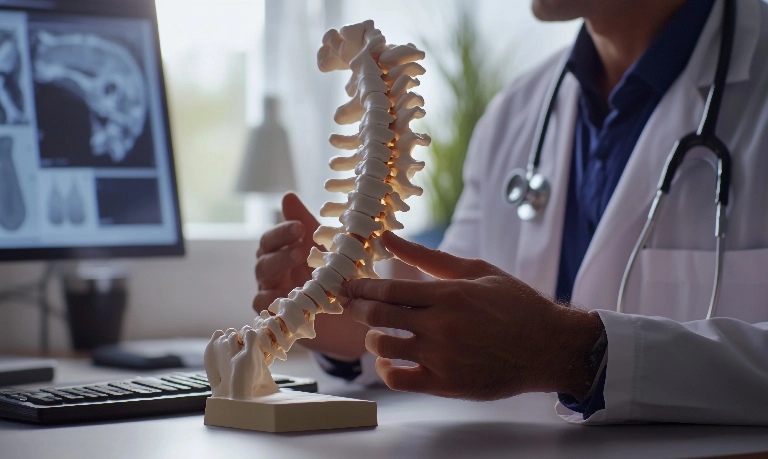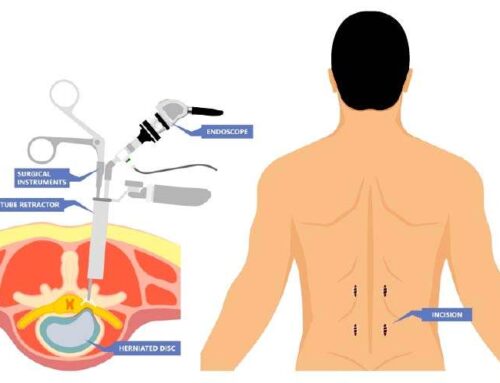The human body is an intricate system of connections and communications with the central nervous system (CNS) at the helm. Comprising the brain and spinal cord the CNS plays a crucial role in regulating body functions controlling movement and processing sensory information. This Blog explores how the spine and brain interact and their impact on overall health especially concerning Spine Surgery in Ahmedabad.
The Role of the Spine in the Central Nervous System
The spine a complex structure made up of vertebrae, discs and ligaments provides essential support and protection for the spinal cord. The spinal cord acts as a conduit transmitting signals between the brain and the rest of the body. It plays a pivotal role in reflex actions and voluntary movements. The health of the spine is vital for the optimal functioning of the central nervous system as any damage or condition affecting the spine can disrupt the communication pathways that are essential for the body to operate effectively.
The spine is composed of vertebrae that protect the spinal cord and provide structural support. It plays several critical roles in the nervous system:
Important Components of the Spine
The central nervous system consists of two main components:
1. The Brain
The brain is the command center of the body responsible for thought processes, emotions and voluntary movements. It interprets signals received from the spinal cord and peripheral nervous system allowing for coordinated responses to the environment.
2. The Spinal Cord
The spinal cord acts as a communication highway between the brain and the rest of the body. It transmits sensory information from the body to the brain and motor commands from the brain to the body enabling movement and reflexes.
How the Central Nervous System Controls the Body
The CNS controls the body through a series of intricate processes:
1. Sensory Input
The body receives sensory information through the peripheral nervous system which includes nerve endings that detect stimuli such as touch, temperature and pain. This information is transmitted to the spinal cord and then relayed to the brain for interpretation.
2. Processing and Integration
The brain processes the sensory information determining the appropriate response. This can involve simple reflexes (like pulling away from a hot surface) or more complex actions that require cognitive processing.
3. Motor Output
Once the brain has processed the information, it sends signals back down the spinal cord to the appropriate muscles and glands, facilitating movement and bodily responses. This motor output is crucial for actions ranging from voluntary movements to involuntary reflexes.
Common Spinal Issues Affecting the CNS
Various conditions can disrupt the normal functioning of the spine and the central nervous system. These may include:
If you experience symptoms related to these conditions consulting a spine specialist in Ahmedabad is essential to determine the best course of treatment.
Spine Surgery: When is it Necessary?
In cases where conservative treatments like physical therapy, medication or lifestyle changes are ineffective spine surgery may be necessary. The goals of spine surgery include:
Choosing the Right Spine Hospital
Selecting the right facility for Spine Surgery in Ahmedabad is critical for successful outcomes. Asian Hospital, recognized as one of the best spine hospital in Ahmedabad offers advanced technology and expert care for patients. The hospital’s experienced spine specialists are equipped to handle a wide range of spinal conditions utilizing minimally invasive spine surgery techniques to ensure quicker recovery times and less postoperative discomfort.
The final part of it….
The spine and brain are integral components of the central nervous system controlling the body’s movements and responses to stimuli. Understanding their roles can help individuals appreciate the importance of spinal health. If you are experiencing spinal issues or symptoms affecting your quality of life consult a spine specialist in Ahmedabad to explore your treatment options. At Asian Hospital, patients receive personalized care tailored to their specific needs ensuring the best possible outcomes for Spine Surgery in Ahmedabad. Prioritize your spinal health and take the first step towards a pain free life.





